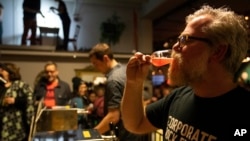Thirty years ago, Icelanders drank beer legally for the first time in more than a generation.
On Friday, the country celebrated the anniversary of the end of a long ban on beer. Fittingly, the celebration is called “Beer Day.”
The drink was outlawed in Iceland for 74 years. All other alcohol remained legal, however.
The beer ban finally ended on March 1, 1989.
The ban was left over from the country’s prohibition days, which began in 1915 after the population voted in a referendum to outlaw all alcohol.
The ban partly ended just seven years later out of economic need. Spain refused to buy Iceland’s largest export, fish, unless Iceland bought Spanish wines.
Prohibition ended in another national referendum in 1933, by a very small majority. In an effort to keep the peace, Iceland’s parliament decided to continue to ban beer.
Historian Stefan Palsson is a beer lover who works part-time at a brewery-based “School of Beer.” He said that back in 1933, Icelanders did not care much about beer.
“They drank in order to become drunk and beer wasn’t really efficient for that,” Palsson said.
Alcohol abuse remains a problem in Iceland. One in 10 Icelandic men over the age of 15 have been to alcoholism treatment at least once, the country’s leading addiction treatment center, SAA, says.
Most Icelanders agree with strong government restrictions on alcohol sales to reduce alcoholism. All alcohol —including beer — is only sold at government-run stores that have high taxes.
A drinker can also, of course, just go to a bar, where a pint of beer usually costs about 1,100 krona ($9).
Icelanders’ opinions of beer began changing in the 1970s, when more of them started traveling to sunny European beach communities and enjoying the drink.
The call for beer of their own became strong. Yet even by 1988, many people were against ending the beer ban, including some politicians.
Steingrimur Sigfusson is parliamentary speaker. He recalls that, at the time, there was a real fear of change. Many thought hundreds of bars would open for beer-drinkers and change society for the worse.
Sigfusson himself voted against ending the ban. He still defends the country’s restrictive alcohol policies that aim to limit alcohol abuse or under-age drinking.
“The worst-case predictions never came true, but underage drinking did increase,” he said.
When the ban finally ended exactly 30 years ago, all four bars in Iceland’s capital, Reykjavik, were full of happy drinkers. In one day, Iceland’s 260,000 people bought 340,000 cans of beer at government-run alcohol stores.
Hreindis Ylva was born the day the ban ended. She celebrated her 30th birthday Friday with friends in Reykjavik. But she was not drinking any beer.
“The taste is not for me,” Ylva said.
I'm Susan Shand.
The Associated Press reported this story. Susan Shand adapted the AP reports for VOA Learning English. Ashley Thompson was the editor.
Write to us in the Comments Section or on our Facebook page.
________________________________________________________________
Words in This Story
beer – n. an alcoholic drink made from malt and flavored with hops
brewery – n. a place where beer is made
prohibition – n. the act of not permitting something to be used or done
wine – n. an alcoholic drink made from the juice of grapes
efficient – adj. capable of producing desired results without wasting materials, time, or energy
addiction – n. a strong and harmful need to regularly have something such as a drug or alcohol
pint – n. a unit for measuring liquids that is equal to 0.473 liters, a glass of beer
bar – n. a building or room where alcoholic drinks and sometimes food are served
beach – n. an area covered with sand or small rocks that is next to an ocean or lake






